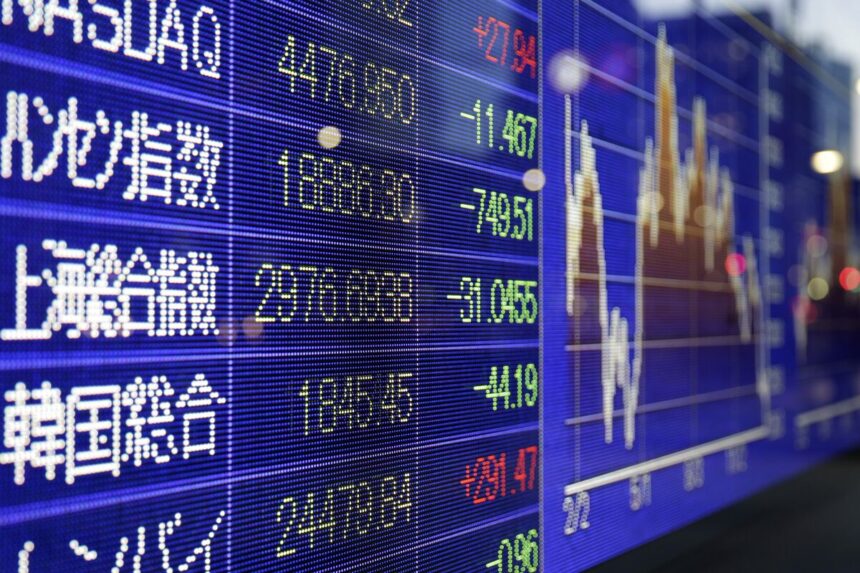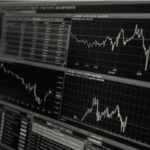Asia stocks market posted modest gains on Monday while the dollar remained under pressure, as confusion over U.S. trade policy continued to cloud investor sentiment at the start of a critical week packed with economic data releases and corporate earnings reports. Adding to the global unease, national elections in Canada and Australia loom, while U.S. President Donald Trump remains a dominant figure in international markets.
Despite President Trump’s repeated claims that progress is being made in trade negotiations with China and other countries, tangible evidence remains elusive. U.S. Treasury Secretary Scott Bessent on Sunday stopped short of backing Trump’s assertions, admitting that no concrete tariff talks with Beijing had resumed.
“The uncertainty itself is at least as damaging as the tariffs, impacting the U.S. economy as much as global markets,” said Christian Keller, head of economics research at Barclays. “Even if this earnings season shows robust figures, many companies will likely prepare to cut back until visibility improves. This increases the risk of a recession.”
Also Read: Buy Now or Wait? US Consumers React Cautiously Amid Tariff Uncertainty
Trading volumes were light across Asia. MSCI’s broadest index of Asia-Pacific shares outside Japan inched up 0.1%. Japan’s Nikkei gained 0.4%, supported by stable domestic earnings, while South Korea’s KOSPI firmed 0.2%. Chinese blue chips were largely unchanged as officials maintained growth targets, despite the escalating tariff pressures.
European markets also pointed toward a cautious open. Futures for the EURO STOXX 50 climbed 0.2%, while FTSE and DAX futures each rose 0.1%. However, U.S. futures painted a gloomier picture, with S&P 500 futures dipping 0.5% and Nasdaq futures slipping 0.6%. The S&P 500, though having rebounded nearly 12% from its April 8 trough, still lags about 10% below its peak earlier this year.
Corporate earnings have generally offered some support. So far, companies have posted earnings growth of over 9%. However, Bank of America noted that only 64% of firms have beaten earnings-per-share estimates, compared to 71% in the previous quarter.
This week will be crucial as around 180 S&P 500 companies — representing over 40% of the index’s market value — are set to report earnings. Among them are tech heavyweights Apple, Microsoft, Amazon, and Meta Platforms. Their results are expected to heavily influence broader market sentiment.
The economic calendar is equally crowded. Investors will be watching closely for U.S. employment data, gross domestic product (GDP) figures, and inflation updates. Payrolls are expected to show an increase of 135,000 jobs, and inflation is anticipated to ease slightly. However, GDP figures are more uncertain, particularly as a surge in gold imports is likely to skew the headline numbers lower. Median forecasts suggest a mere 0.4% annualized growth, although the Atlanta Fed’s GDPNow model forecasts a possible contraction of 0.4% when excluding gold imports.
Read More: Trade Developments Puts Negative Impact US Stock, Consumer Market
Dollar Held Hostage by Policy Uncertainty
Currency markets remained volatile. The dollar index was slightly lower at 99.565, well above last week’s low of 97.923 but still vulnerable. The euro held firm at $1.1364, close to its recent highs.
“The upcoming non-farm payrolls data will be key in shaping expectations for Federal Reserve policy,” said Jonas Goltermann, deputy chief markets economist at Capital Economics. Futures markets are currently pricing in a 64% chance of a rate cut in June and around 85 basis points of easing by the end of the year. Goltermann suggested a stronger payrolls number could delay easing expectations and support a dollar rebound. However, he warned that “the Trump administration’s unconventional approach across policy areas could cause longer-term damage to confidence in the dollar as a safe haven.”
In other currencies, the dollar held at 143.40 yen, having bounced from a seven-month low of 139.89 but still down over 4% for April.
Meanwhile, expectations for weaker inflation data from Germany and the eurozone are fueling bets that the European Central Bank will cut interest rates at its June meeting. The Bank of Japan, facing similar trade-related uncertainties, is expected to hold its key rate steady at 0.5% when it meets this week.
Bond markets stabilized after Trump reassured investors that he would not attempt to fire Federal Reserve Chair Jerome Powell. U.S. 10-year Treasury yields hovered at 4.246%, down from their April peak of 4.592%.
Gold prices, after reaching a record high of $3,500 an ounce, eased back to $3,294 as risk sentiment tentatively improved. Oil markets remained subdued amid concerns over a potential global economic slowdown and increasing supply from OPEC. Brent crude edged up 25 cents to $67.20 a barrel, while U.S. crude rose 30 cents to $63.32.
Follow 10X Times for all business news.






